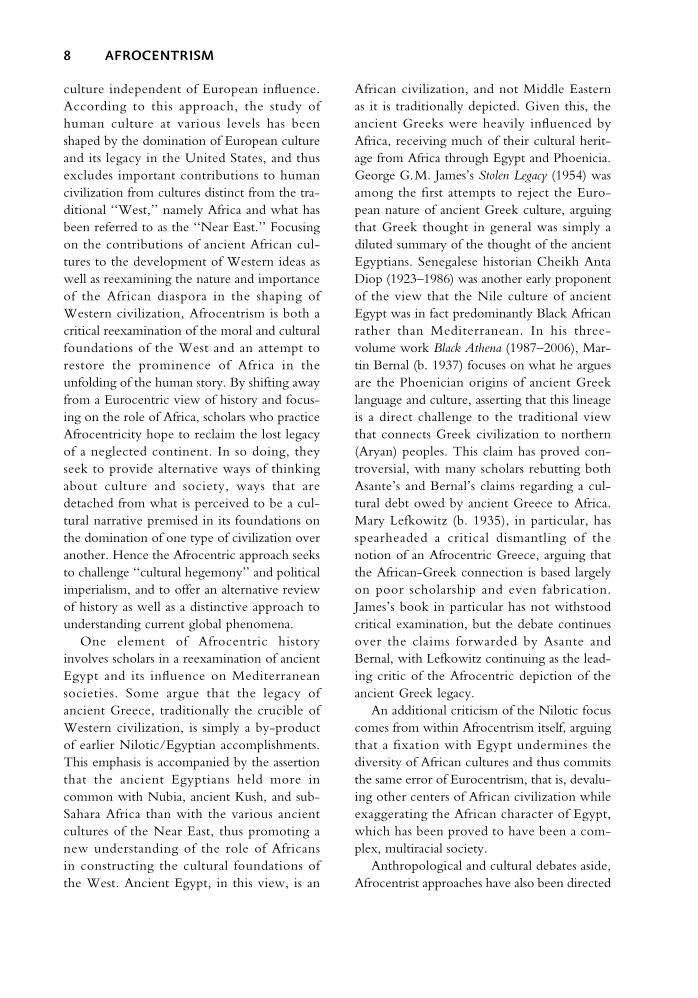culture independent of European influence. According to this approach, the study of human culture at various levels has been shaped by the domination of European culture and its legacy in the United States, and thus excludes important contributions to human civilization from cultures distinct from the tra- ditional ‘‘West,’’ namely Africa and what has been referred to as the ‘‘Near East.’’ Focusing on the contributions of ancient African cul- tures to the development of Western ideas as well as reexamining the nature and importance of the African diaspora in the shaping of Western civilization, Afrocentrism is both a critical reexamination of the moral and cultural foundations of the West and an attempt to restore the prominence of Africa in the unfolding of the human story. By shifting away from a Eurocentric view of history and focus- ing on the role of Africa, scholars who practice Afrocentricity hope to reclaim the lost legacy of a neglected continent. In so doing, they seek to provide alternative ways of thinking about culture and society, ways that are detached from what is perceived to be a cul- tural narrative premised in its foundations on the domination of one type of civilization over another. Hence the Afrocentric approach seeks to challenge ‘‘cultural hegemony’’ and political imperialism, and to offer an alternative review of history as well as a distinctive approach to understanding current global phenomena. One element of Afrocentric history involves scholars in a reexamination of ancient Egypt and its influence on Mediterranean societies. Some argue that the legacy of ancient Greece, traditionally the crucible of Western civilization, is simply a by-product of earlier Nilotic/Egyptian accomplishments. This emphasis is accompanied by the assertion that the ancient Egyptians held more in common with Nubia, ancient Kush, and sub- Sahara Africa than with the various ancient cultures of the Near East, thus promoting a new understanding of the role of Africans in constructing the cultural foundations of the West. Ancient Egypt, in this view, is an African civilization, and not Middle Eastern as it is traditionally depicted. Given this, the ancient Greeks were heavily influenced by Africa, receiving much of their cultural herit- age from Africa through Egypt and Phoenicia. George G.M. James’s Stolen Legacy (1954) was among the first attempts to reject the Euro- pean nature of ancient Greek culture, arguing that Greek thought in general was simply a diluted summary of the thought of the ancient Egyptians. Senegalese historian Cheikh Anta Diop (1923–1986) was another early proponent of the view that the Nile culture of ancient Egypt was in fact predominantly Black African rather than Mediterranean. In his three- volume work Black Athena (1987–2006), Mar- tin Bernal (b. 1937) focuses on what he argues are the Phoenician origins of ancient Greek language and culture, asserting that this lineage is a direct challenge to the traditional view that connects Greek civilization to northern (Aryan) peoples. This claim has proved con- troversial, with many scholars rebutting both Asante’s and Bernal’s claims regarding a cul- tural debt owed by ancient Greece to Africa. Mary Lefkowitz (b. 1935), in particular, has spearheaded a critical dismantling of the notion of an Afrocentric Greece, arguing that the African-Greek connection is based largely on poor scholarship and even fabrication. James’s book in particular has not withstood critical examination, but the debate continues over the claims forwarded by Asante and Bernal, with Lefkowitz continuing as the lead- ing critic of the Afrocentric depiction of the ancient Greek legacy. An additional criticism of the Nilotic focus comes from within Afrocentrism itself, arguing that a fixation with Egypt undermines the diversity of African cultures and thus commits the same error of Eurocentrism, that is, devalu- ing other centers of African civilization while exaggerating the African character of Egypt, which has been proved to have been a com- plex, multiracial society. Anthropological and cultural debates aside, Afrocentrist approaches have also been directed 8 AFROCENTRISM
Document Details My Account Print multiple pages
Print
You have printed 0 times in the last 24 hours.
Your print count will reset on at .
You may print 0 more time(s) before then.
You may print a maximum of 0 pages at a time.

























































































































































































































































































































































































